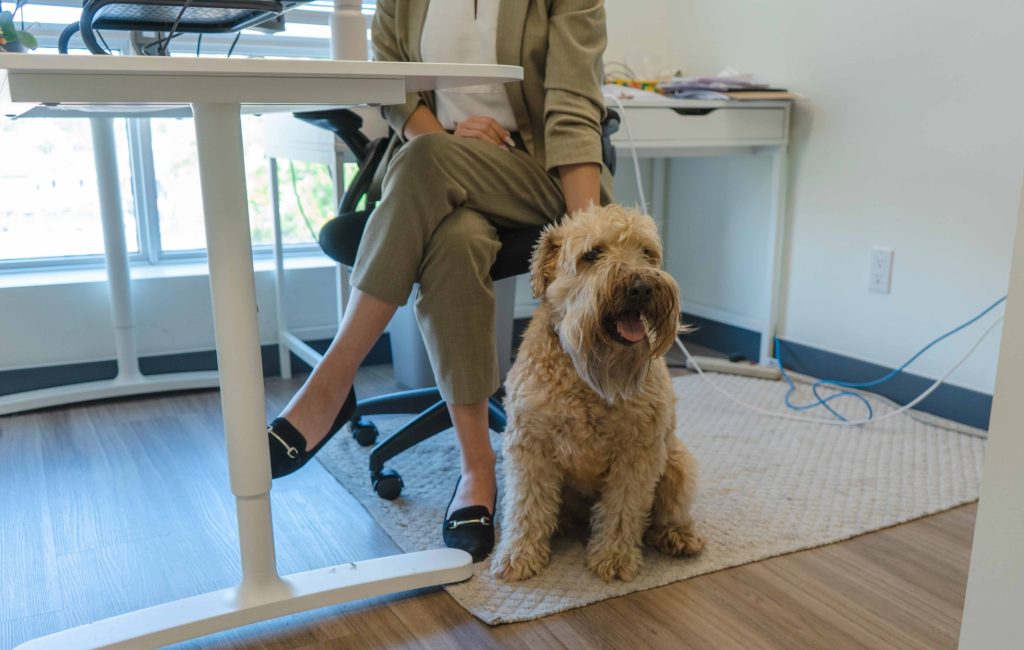In today's fast-paced work environments, finding ways to promote well-being and reduce stress is crucial. At the Oakville & Milton Humane Society (OMHS), we know that the benefits of having pets in the workplace are not far-fetched. In fact, multiple studies have found that having dogs in the workplace provide employees a greater sense of overall wellbeing including increased job satisfaction, reduced absenteeism, increased productivity and improvements to mental and physical health. From left to right: Bill Wodhams, office manager, Vanessa Aquino, administration, Jennifer Morgan, senior law clerk.
“Dogs have a unique ability to lighten the mood and reduce stress, helping us stay grounded and keep things in perspective,” said Jennifer Morgan, Stoner & Company Family Law, senior law clerk.
Before welcoming pets in the workplace, there are many details for employers to consider first.
“Ensuring the safety of staff and pets is vital,” said OMHS human resources manager, Brianne Bresolin.
“First, engage with staff to understand potential challenges including their comfort with dogs and/or cats, staff allergies, potential distractions such as barking and whining and fall hazards. If it seems that your workplace is suitable, consider starting off with monthly bring your pet to work days and assess how it’s working out for people and pets,” suggests Bresolin.
Employers considering a pet-friendly office should prepare a written policy that outlines the rules and regulations for pets in the workplace, including the requirement for dogs to be licensed and spayed/neutered.
At Stoner & Company Family Law, dogs are truly valued as part of the team, with four staff dogs even listed along side the lawyers and law clerks on the ‘about us' section of their website.
“We welcome dogs into the office with open arms. As long as dogs are well-behaved, they fit right in and make the work environment more enjoyable,” said Morgan.
What you need to know about becoming a pet-friendly work environment
Below are just a few of the overall perks pets provide in the workplace:
- Decreased stress levels: one study had participants take a saliva sample to determine baseline cortisol, a hormone that measures a person’s stress. Throughout the day, employees were asked to track their stress levels four times. Employees who were accompanied by their dogs showed a noticeable decrease in stress levels compared to those that left their dogs at home.
- Positive perception of their employer: employees who work at a pet-friendly workplace reported having a higher positive perception towards their employer, job satisfaction, productivity and morale.
- Increased engagement and communication: Pets can be a great icebreaker because they facilitate social interaction by providing a topic of discussion to bond over. This is especially beneficial for new employees getting to know their co-workers.
- Great for recruitment and retainment: One of the greatest benefits for businesses, a pet-friendly work policy can attract and retain new employees.
The drawbacks of dogs in the workplace
Before implementing a pet-friendly workplace, companies need to consider the health, wellbeing and safety issues of all employees to maintain an inclusive work environment.
Below is a list of potential drawbacks to dogs in the workplace:
- Allergies: Dog and cat allergies affect around 10-20% of the population worldwide. Having dogs in the workplace can pose a significant risk to employees with allergies. If employees have allergies, employers should consider allowing employees to work from home or a designated days to allow dogs in the office.
- Distractions: dogs can cause distractions at work, especially when they’re young. Distractions can include barking and whining. What’s more, they might need more attention, food, and exercise than they can get in the workplace.
- Consider your dog’s behaviour and employees’ feelings: Not every dog is cut out for office life. If your dog has behavioural issues, it may best to leave them at home to avoid any issues that may arise and jeopardize the safety of employees and the reputation of the company. On the contrary, some employees may have cynophobia—a fear of dogs, this can create an unsafe work environment for employees.
- Slip, trip, and fall hazards: with dogs’ low proximity to the ground, as well as leashes and toys, employers should be mindful of environmental safety hazards to avoid any workplace injuries.
Tips to implementing a dog-friendly workplace
Dogs in the workplace is something to bark about. Before implement a pet-friendly workplace, companies should make sure all hands and paws are on deck.
Here are some tips:
- Require dogs to be licensed and fixed: Dog licensing is required in most jurisdictions including Oakville and Milton. All dogs should be licensed and fixed to guarantee the safety of employees and other dogs.
- Let others know there are dogs on the premises: Not everyone loves having dogs in the workplace. Employers should consider polling staff to learn how they feel about pets in the workplace and make decisions based on their feedback.
- Put it in writing: Any businesses considering a pet-friendly office should prepare a written policy that clearly outlines rules and regulations surrounding pets in the office. This policy is not just for dog parents, but also for the company. Any issues regarding employees bringing pets to work should be addressed within this policy.
- Prepare: Create designated times to let pets eat or relieve themselves: just like we need supplies for work, so do your dogs. Make sure you pack treats and toys to keep them occupied. Employees should also dedicate times to relieve themselves or stretch.

